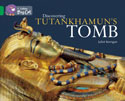You might think that an activity pack on Ancient Egypt is going to be all about History but here we’ve got together two activities for maths related to the topic.
Activity One
Year 4 to Year 6
In this activity the children use what they have learned about probability and chance to decide whether there’s such a thing as the ‘Curse of Tutankhamun’
LO:
Use statistics and probability to decide on the likelihood of an event happening
To be able to make a judgement based on information collected in the course of an investigation
 Talking Point:
Talking Point:
Read the Big Cat book ‘Discovering Tutankhamun’s Tomb’ to the class and tell them about the famous curse and the victims it claimed. Ask them if they think there’s such a thing as the ‘Mummy’s Curse’ and on what do they base their belief.
Activity:
A lot of people died and a lot of strange things happened after Tutankhamun’s tomb was opened with the events being put down to a curse put upon those who opened the tomb. Many seemingly unexplainable events can be explained through chance and probability and you should ask the children to consider the following facts before reassessing their belief in a curse.
Talking Point:
Based on the probability of these events happening, do you think there’s still such a thing as the ‘Curse of Tutankhamun’.
At Home:
Can you find other examples of a curse? Think of the book of Exodus, Harry Potter, Hound of the Baskervilles etc.
Activity Two
Children love games and when there’s the supernatural involved, they’re really motivated. In this activity, they have to be archaeologists looking for the lost tomb of a pharaoh and must design a game where, as in real life, chance or luck, good or bad, plays a part in success or failure.
LO:
Be able to consider the effect of chance and probability before making a decision
Develop a game based on probability
Talking Point:
Do a little revision practice on probability by asking children what they think the likelihood of an event taking place might be. Use questions such as the following and look for answers that are in the format ‘likely, unlikely, impossible, etc. as well as the format ‘one in…’ etc.
What are the chances of it raining today?
What are the chances you’ll get no homework tonight?
What is the probability that we’ll discover an ancient Egyptian tomb in the playground?
What is the likelihood of one of us becoming the Prime Minister?
Ask the children how they would play and win a game of snakes and ladders?
They should tell you that it depends on the throw of a dice with the higher the throw, the more likely you are to win unless you land on a snake when you are penalised or on a ladder when you are rewarded.
Ask them to think of a simple board game where the movement is by the chance roll of a dice but where landing on certain squares can improve or reduce their chances of winning. They should use the topic of ancient Egypt and discovery in doing so.
Once the game has been developed, get them to teach it to another child and then calculate some of the probabilities involved.
At Home:
Play their board game with family members, explaining the probability of winning to them.
Dave Lewis
Primary Teacher
For more hands-on history projects take a look at Belair On Display: Creative History




